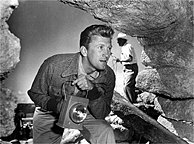The New Times Ombudsman is a Bad Joke
I interrupt my summer vacation (wife & boys in Europe for a month, while I relax/zone-out at San Diego beaches) to bring you this unsurprising newsflash: The New York Times’ ombudsman is another bad joke. Clark Hoyt, of distinguished Leftward-bias MSM background, continues the sad record of major newspaper ombudsmen failing to research their opinions, thus failing to fulfill their function of being an independent check upon the quality of their newspaper’s journalism, instead just adding another layer of incompetent journalism.
I’ve made a minor hobby of dissecting the pretense of ombudsmen as protectors of journalistic quality, dealing with some of its most prominent. (My latest, here, also has links to the previous.)
Minneapolis’ John Hinderaker of Powerline blog, not having the lotusland weather of my home San Diego to lull him, applies his sharp lawyerly eye to Clark Hoyt.
…The administration is blaming al Qaeda for violence in Iraq, to the "virtual exclusion of other sources;" al Qaeda is the "single villain." Hoyt doesn't seem to have done any research to bolster this claim….I decided to test that claim by reviewing the press releases that the Multi-National Force has put out so far in July. There are a total of 87 press releases, which I thought would be a representative sample, as well as, obviously, an up to date one.
I found that only 29 of those 87 press releases mentioned al Qaeda at all; 58, or two-thirds, made no reference to that organization. Further, of those that attributed violent acts to some enemy of the U.S. and the Iraqi government, 37 mentioned persons other than al Qaeda; e.g., "insurgents," an "extremist group," an "IED cell," etc. So, far from focusing on al Qaeda to the "virtual exclusion" of other groups, 55% of the time, the military does not mention al Qaeda at all.
The factual statements on which the Times' Public Editor premised his entire analysis were simply false, and easily shown to be so.
However, it appears that no one at the Times thought it was worth taking two hours (as I did) to review IOF press releases to see whether the Public Editor's assertions could withstand scrutiny. It's odd: they have a huge budget, while we have no budget at all and don't even do this for a living.
Hinderaker continues to dissect and expose Hoyt’s ignorant and incompetent bias. The post should be archived for its documented indictment.
Hoyt ends his column with the admonition:
Military experts will tell you that failing to understand your enemy is a prescription for broader failure.
Allahpundit does an excellent job of doing that, missed by Hoyt’s left-eyed perspective, and the New York Times’ editorial for withdrawal regardless of consequences.
UPDATE:
A distinguished journalist friend, with whom I sometimes agree and sometimes not, contacted me about the above post. His experience with Hoyt speaks to a careful and scrupulous editor of my friend's columns. My friend disagrees with my characterization of Hoyt as having a "Leftward-bias." Hoyt's friends prefer to view him as a "skeptic."
That may be so, or just reflect that "skeptic" is a new short-hand for bias against the administration, particularly when a similar skepticism is not applied toward the Left.
Regardless, Hoyt's column could have done with careful fact-checking and editing, which in his new position as NYT's ombudsman is not applied. Skepticism is either a two-way, indeed omnidirectional, street, or it's a euphemism for bias.


<< Home